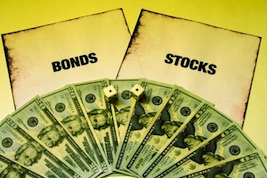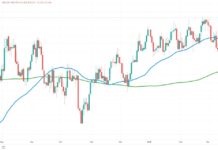 By Jeff Voudrie
By Jeff Voudrie
As a wealth manager of mostly retired investors, I have over the past few years conservatively positioned my clients with the majority of their funds in lower-risk, more conservative investments such as bond funds. I have intentionally kept their equity exposure low due to global macro risk and higher volatility. But the question of stocks or bonds has caught my attention and should be on your radar going into 2013 and beyond.
Stocks or Bonds in 2013?
It may be time to reverse that trend and to decrease the allocation to lower-risk, conservative bond-oriented investments and increase the allocation in lower to medium risk, equity-oriented investments. Over the last few years, I thought that the best risk-adjusted returns would be found in bond-oriented investments. And they have. One bond fund I’ve used the last several years was up over 20% in 2012 with little volatility. Another, more conservative one was up over 10%. I see little reason to take on the risk associated with equities if returns like that are available in bonds. Those days, though, may be coming to an end.
The reason that I feel it is time to decrease the amount allocated to bonds and increase the amount allocated to equities is because the economy is showing signs of growth stabilizing. And the more clear that becomes, the more likely interest rates are to start increasing. As well, there has been a risk premium associated with company stocks due to the uncertainty over the economy, the Fiscal Cliff, the European Debt Crisis, the Mortgage Crisis and the Growth-Slowing-In-China crisis (to name just a few!). The more that these crises begin to resolve themselves, even in a negative way, the less uncertainty companies face (which tilts the question of stocks or bonds towards stocks).
In other words, regardless of the Fiscal Cliff negotiations (or any of the other crises), businesses will be able to make adjustments and move forward. It is like they are at a ‘Y’ in the road and they are waiting for the fog to lift to see which direction they need to go. The more it becomes evident that the economy and consumer spending is stabilizing, the more the fog of uncertainty will lift. And further, the more money will begin to flow into equities.
Currently, the overall consumer price index has remained around 1%. The more the economy stabilizes the more likely that inflation will begin to creep back into the economy. Frankly, higher inflation and higher interest rates will help our economy and retired wealth investors, assuming they are properly positioned to take advantage of it. History has shown that stocks provide a better hedge against inflation than bonds or even precious metals do.
However, I won’t be moving my retired investors back into equities without adequate safeguards in place. I will employ multiple strategies and methodologies in an attempt to mitigate the increased risk associated with equities, but believe that on a risk-adjusted basis they will do better than bonds.
This change is allocation is not without risk. The costs associated with the implementation of Obamacare or the drag on our economy caused by massive deficits may mean that the economy stabilizes but fails to grow. It is also possible that we could become like Japan where they have printed money for decades and failed to ignite inflation. Even in the midst of a declining Yen, the Japanese stock market has been in a decline for over 20 years. So there continues to be significant risk associated with equities. That doesn’t mean they should be avoided completely, but it is vital that retired investors have multiple layers of risk management processes that are designed to manage that risk.
This change in the investment landscape brings up several important points that retired wealth investors need to keep in mind. First, every financial plan needs to have flexibility built into it; this allows investors to take advantage of (and be protected from) market shifts. Set-it-and-forget-it is a strategy guaranteed to devastate the best laid retiree income plan. Second, investors can’t rely solely on a ‘rear-view mirror’ to determine investment decisions today. What worked in the past will not keep working that way forever. And third, be sure you choose an advisor who has safeguards in place to keep you and your nest egg from getting burned in today’s volatile markets.
There are difficult and perilous times ahead, but the early indications are that growth is stabilizing and that bond yields may have ended their decline. If you’re expecting the recent generous gains of bonds to continue, you may be in for a nasty surprise in 2013. Review your allocations now and if you have any concerns, you can contact me for my perspective at jeff@CommonSenseAdvisors.com.
Common Sense Advisors does not offer investment advice via this medium. Under no circumstance whatsoever do these postings, opinions, charts, or any other information represent a recommendation or personalized investment, tax, or financial planning advice. Learn more about our firm at www.commonsenseadvisors.com
Twitter: @JeffVoudrie @seeitmarket
Any opinions expressed herein are solely those of the author and do not in any way represent the views or opinions of any other person or entity.








